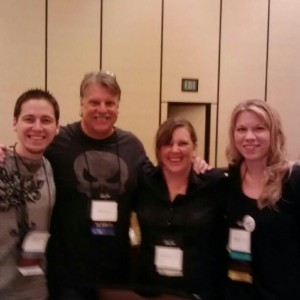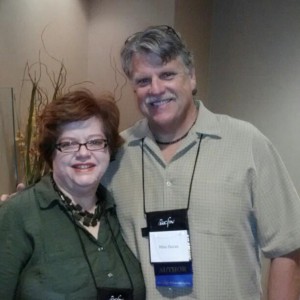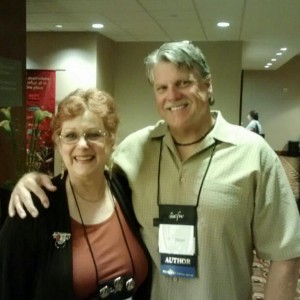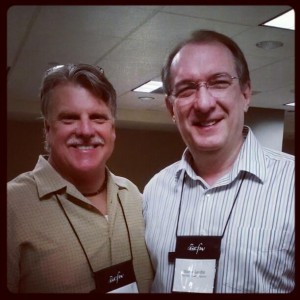As much as I criticize the ACFW and Christian fiction in general, please know that it’s because I have a heart for Christian writers. There are so many great  people in our industry! If anything, the four days I spent in Dallas at the annual ACFW conference reminded me how many genuine, wonderful Christian writers there are out there, and how important our industry is and can be. No, it didn’t eliminate my questions (as you’ll see). But it was fun to make new connections and helpful to put faces and voices on the gravatars. It reinforced what a vibrant community the Christian fiction industry is.
people in our industry! If anything, the four days I spent in Dallas at the annual ACFW conference reminded me how many genuine, wonderful Christian writers there are out there, and how important our industry is and can be. No, it didn’t eliminate my questions (as you’ll see). But it was fun to make new connections and helpful to put faces and voices on the gravatars. It reinforced what a vibrant community the Christian fiction industry is.
With that, here’s some random observations and thoughts culled from the conference.
All the beautiful people! Ready for some name dropping? Here’s a sampling of some of the folks I fraternized with: Grace Bridges of Splashdown Books, who wore tiger slippers and a Star Trek uniform (not at the same time, of course), author and editor Ramona Richards, spec author Marc Schooley, who shared one of the two most memorable stories I heard at the conference, Randy Ingermanson, YA author Jill Williamson, whose table I had the pleasure of sitting at for the awards banquet, Dineen Miller, Jim Rubart, the delightful Katie Ganshert (who hits like a girl), Caleb Jennings Breakey who, like me, loves the Church and publicly admits it (and won the Genesis award in the Speculative Fiction category), Dave Long, Senior Acquisitions Editor for Bethany House Publishers who sat next to me one lunch session and endured an endless stream of questions from me (sorry, Dave), Morgan Busse, long-time blog-follower Jason Joyner, Michael Ehret, Brenda Anderson, latest Books & Such client Brandy Vallance (who also won the Genesis award in the historical category), Rosslyn Elliot (who won TWO awards for Best Debut Novel and Long Historical), Shannon McNear, CathiLyn Dyck, who I seemed to bump into every other turn, devotional writer Donna Pyle, another Books & Such client who confessed that I’m not nearly as intimidating in person as I seem online, Bonnie Calhoun, who seemed to suggest that my profile pic flatters me (snort!), Meg Moseley, Ane Mulligan, one of my early mentors who received a two-book contract at the conference (Way to go, Ane!), and literary agent Steve Laube, who surprised me by saying he reads my stuff and graciously spent a half-hour discussing industry related topics. And there were many, many others.
There were some VERY good workshops this year. At th e top of my list would be Davis Bunn‘s two-day workshop on postmodern story structure. Bunn serves as Writer-In-Residence at Regent’s Park College, Oxford University, and has recently been named Lecturer in Oxford’s new creative writing program. Bunn’s sessions were dense, somewhat academic, and riveting. Wow! Now this — THIS — is the type of topic every Christian writer should contemplate. Frankly, I was pleasantly surprised to find something this meaty being taught at a Christian writers conference and hope it continues. There were two agent panels. I attended the one with my agent, Rachelle Gardner. They fielded questions and, as these things go, there’s usually oodles of inside inights one can acquire. Another neat workshop was the Q&A session with Allen Arnold, former Senior Vice-President and Fiction Publisher at Thomas Nelson. Also, Fiction By the Numbers by ECPA (Evangelical Christian Publishers Association) President, Mark Kuyper, was fascinating (especially if you love graphs and charts and statistics about what sells and what doesn’t). Props to the ACFW conference staff for putting together some great workshops this year.
e top of my list would be Davis Bunn‘s two-day workshop on postmodern story structure. Bunn serves as Writer-In-Residence at Regent’s Park College, Oxford University, and has recently been named Lecturer in Oxford’s new creative writing program. Bunn’s sessions were dense, somewhat academic, and riveting. Wow! Now this — THIS — is the type of topic every Christian writer should contemplate. Frankly, I was pleasantly surprised to find something this meaty being taught at a Christian writers conference and hope it continues. There were two agent panels. I attended the one with my agent, Rachelle Gardner. They fielded questions and, as these things go, there’s usually oodles of inside inights one can acquire. Another neat workshop was the Q&A session with Allen Arnold, former Senior Vice-President and Fiction Publisher at Thomas Nelson. Also, Fiction By the Numbers by ECPA (Evangelical Christian Publishers Association) President, Mark Kuyper, was fascinating (especially if you love graphs and charts and statistics about what sells and what doesn’t). Props to the ACFW conference staff for putting together some great workshops this year.
The demographics at the ACFW conference perfectly represented the demographics of their market. This is something that bugs the crap out of me and, when I say it, can seem hateful and chauvinistic and a lot of things it’s not. I’m estimating, mind you. But from my standpoint, 30-55  year-old white women comprised at least half, but more like two-thirds, of the attendees. Yes, this is the target market for the CBA / ECPA. But it gives the conference the feel of, I dunno, a mid-western homemakers convention. I could probably count the number of African Americans on one hand. Men are a rarity as well, perhaps 15%-20% of the crowd. And Speculative Fiction writers, maybe a 5-10% sliver who always seem to sit on the fringes of the banquet hall and enjoy themselves. Question: Are we happy with this rather narrow demographic sampling?
year-old white women comprised at least half, but more like two-thirds, of the attendees. Yes, this is the target market for the CBA / ECPA. But it gives the conference the feel of, I dunno, a mid-western homemakers convention. I could probably count the number of African Americans on one hand. Men are a rarity as well, perhaps 15%-20% of the crowd. And Speculative Fiction writers, maybe a 5-10% sliver who always seem to sit on the fringes of the banquet hall and enjoy themselves. Question: Are we happy with this rather narrow demographic sampling?
It was pretty amazing how many people “know me” through my blog. At least a dozen (probably more like two dozen) people introduced themselves to say they read my blog. Most of them also described themselves as “lurkers.” Very encouraging. Not the lurking part, the reading part. It’s a reminder that the time I spend here isn’t always a complete waste.
Michael Hyatt was okay. Sorry, but his presentations just seemed like rehashed leadership-related stuff. Don’t get me wrong, Hyatt (former Chairman and CEO of Thomas Nelson Publishers) is a guy to follow and he’s cutting-edge with some of his platform-building, leadership, social networking related discussions. I just found his presentations oddly flat. (And his final anecdote about “Coal Walking” with Tony Robbins didn’t do any favors for my overall impressions.) Maybe it was because he never really explored what was a very, very big topic of discussion among my circle of friends: HarperCollins’ buyout of TN and Zondervan and what impact that could ultimately have on the Christian book industry. Now that’s a topic Hyatt could probably do justice to.
E-books have absolutely rocked the publishing industry. Okay. So this goes without saying. But it seemed like every other discussion and presentation referenced how much digital readers and reading has impacted what publishers are doing.
There’s a very real division between the “Old Guard” and “New Guard.” Let me give you an example. I attended a workshop with Allen Arnold, former fiction acquisitions editor for Thomas Nelson. Really, it was just one long Q&A session, so the conversation went everywhere. I’d estimate maybe fifty-plus attendees. Being it was an open forum and Mr. Arnold has commented on this blog, I took the opportunity to ask about the ever thorny language guidelines and what I perceive as a need for more realism in Christian fiction. It lead to a much longer discussion with other attendees chiming in, mostly in agreement. Until one gentleman, visibly shaken, made an impassioned plea that we should not be apologizing for Christian fiction. We are writing some of the best books on the planet, he said, and we have the message the world needs to hear. It was a clear counter to the point I’d raised and, unlike my question, received a polite round of applause. Just a reminder that there is a very real polarization when it comes to discussing what Christian fiction should be.
Christian publishers have absolutely no idea what to do with speculative fiction. Or YA. Both are a very thin slice of the industry pie and often a marketing headache. A couple examples. Randy Ingermanson was one of the first authors to write speculative Christian fiction (some novels over a decade ago). He admitted he was planning to edit the books and re-introduce them into the general market. Why? Because spec-fic doesn’t sell well in the CBA. Another example: During the agent panel I attended, the question arose about YA lit and the agents’ response was sort of meh. In fact, Rachelle mentioned that one of her teenage daughter’s all-time favorite series was Lisa Bergren’s River of Time (the first which won the 2012 Christy Award for best YA) which was later dropped by Cook… before the series ended. Her daughter was heartbroken. Bergren has since self-published the remainder of the series through CreateSpace. It’s a sad reminder of how orphaned those who write genres other than Romance or Historicals really are.
Finally, my pitches went really good! I think I’ve learned a lot since my crash and burn pitches of 2006. Of course, I didn’t have a lot of hopes that The Ghost Box, an Urban Fantasy with Christian undertones, would interest many. Which could be one reason why I was more comfortable — my expectations were LOW. Interestingly enough, Rachelle pitched my project to an editor who seemed very interested, requested the m/s (which is 2/3 complete) and, thus, I must scoot because I’ve got a proposal and detailed synopsis to begin working on.
Anyway, there’s a lot more. I’ll blog in detail about a couple other things this week. But now I’ve got tons of follow-up to do and new folks to Friend. And I’ll begin debating whether I should attend next year’s conference. Either way, I had a blast!















Miss CP thinks Amish fiction sells because the Amish know how to do stuff we’ve all forgotten–like churn butter. How many times have you churned butter in the last week? Moms with kids at preschool shaking baby food jars full of cream DO NOT count. You’re welcome.
Miss Writerly Crankypants
Mike, here’s a question for you. What do you consider speculative fiction to be, and what do you think the ACFW/Christian market considers speculative fiction to be?
Reading this makes me nostalgic, Mike. I remember meeting at the 2006 conference (also in Dallas), and what you describe sounds a lot like what we experienced then, albeit on a more modest scale.
Your experience pitching tracks with mine, too — the best performances always seem to happen when you have no expectation of success.
We did keep running into each other…that was cool. 🙂 I was real glad to meet you and Jason Joyner there.
I’m honored to merit a mention, Mike! It was so good seeing you again…first time was years ago, in Dallas too, as I recall, the year that Becky Miller also attended.
Loved seeing the guys, even though I didn’t recognize too many on sight. Y’all are getting braver, and I’m glad of it! I’ve heard some people still calling ACFW a “romance con,” which it really isn’t, even though it started out as AC*R*W … still shaking my head over the irony that I, who started out so firmly as a spec writer, just got my very first contract for a historical romance novella. 🙂 Also still a bit stunned to find myself suddenly in the category of contracted author, when I fully expected to be kissing the traditional publishing world goodbye for a while, again. (Waves at Jill.)
Something that has occurred to me over the years is that ACFW–indeed, the whole Church–needs the diversity. We are all members of the same body, but distinctly different in function. It’s interesting how we tend to mentally assent to that truth, and then turn around and feel threatened by someone else’s “differentness.” And it isn’t limited to what we call the bonnet crowd, either–in fact, that term betrays our own prejudice. 🙂 Not all historical writers, or historical romance writers, for that matter, like Amish fiction, just like not all speculative writers enjoy hard-core sci-fi. (Or dragons and unicorns. Whatever. LOL) But we all bring our own special uniqueness to the mix that is Story.
There, now that I’ve offered my $.03 to the mix (and late, at that!), I’ll slink off and make sure my kids get started on their schoolwork for the day … 🙂 Thank you again, Mike! You are MUCH appreciated.